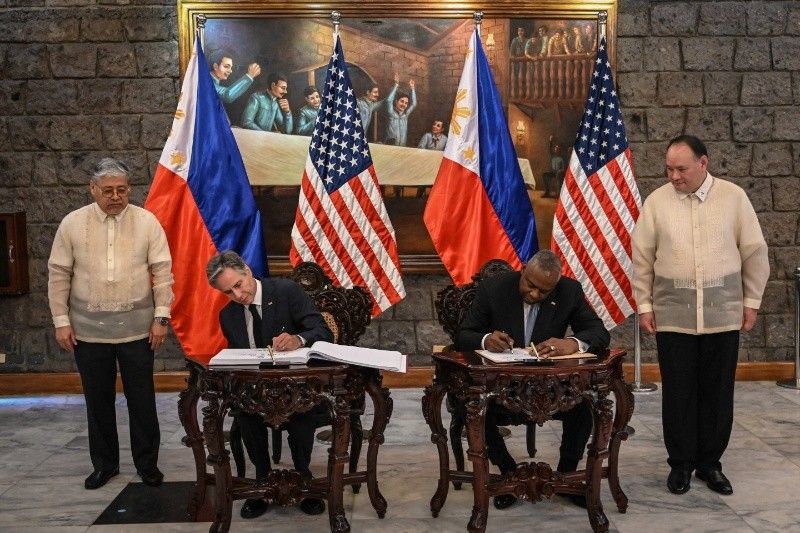Philippine-US defense pact to hold firm regardless of election outcome

MANILA, Philippines — The treaty that compels the United States to defend the Philippines in case of armed attacks will remain unchanged regardless of who wins the 2024 US presidential elections, Philippine Ambassador Jose Manuel Romualdez said on Monday, November 4.
Ahead of a historically tight US election, Romualdez assured that broader defense relations between the Philippines and the US will likely stay the same whether former US president Donald Trump or Vice President Kamala Harris wins the presidency.
"The defense establishment [in the United States] is very much aligned with the way they want our lives to continue," the Philippine ambassador to the US said in an interview with Radyo dzBB.
RELATED: US support for Philippines steadfast regardless of election outcome — officials
Romualdez noted that key defense pacts have remained in place throughout several leadership changes in the US. Support for these has also transcended party lines. These include the mutual defense treaty signed in 1951, the Visiting Forces Agreement (VFA) signed in 1998 and the Enhanced Defense Cooperation Agreement (EDCA) signed in 2014 and in effect since 2016.
"It’s also in the interest of the United States to have a free Indo-Pacific region, especially in terms of freedom of navigation in the South China Sea, since trillions of dollars in trade pass through there," Romualdez said.
"More or less, the interest of the US aligns with ours—to keep the area free and to ensure that territorial sovereignty is respected," the Philippine ambassador said.
Continuity prospects
Under a Harris presidency, the Philippines would likely see a continuation of its defense and diplomatic relations with the incumbent US President Joe Biden, Romualdez said.
But he also rejected notions that a Trump administration might offer weaker support than the current US government.
He said: "As far as the defense relations natin, pareho pa rin. Dahil sa administration nga ni former President Trump yung word na 'ironclad commitment.' That was when it was coined, during the time of former President Trump."
(For our defense relations, they would remain the same. It was actually during former President Trump’s administration that the term "ironclad commitment" was coined.)
It was in 2014, however, when then-US President Barack Obama characterized the US' commitment to defend the Philippines as "ironclad" in a speech delivered before American and Filipino troops at Fort Bonifacio, Manila. His remarks were delivered in the context of the US' reaffirmation of its mutual defense treaty with the Philippines.
RELATED: US elections matter to the Philippines
The Philippines has increasingly turned to the US and its allies for support amid China's unlawful actions in the South China Sea, where Beijing continues to assert claims over disputed waters despite a 2016 ruling that invalidated its basis to do so.
The US has consistently backed the Philippines — its longest treaty ally in the region — in condemning Chinese vessels' aggression in the disputed waters. It has reminded China of its mutual defense treaty with the Philippines and pointed out that it extends to armed attacks anywhere in the South China Sea.
In July, the US pledged an unprecedented $500 million to help the Philippines modernize its military and coast guard and ramp up its territorial defense.
RELATED: US reiterates 'ironclad' commitment to Philippines amid China's show of force
While defense relations are expected to remain stable, Romualdez indicated that economic policies might see changes if Trump returns to office, particularly regarding manufacturing and trade.
Trump's potential policies could focus on encouraging businesses to relocate from China back to the US through tax incentives, especially in critical sectors like semiconductor manufacturing, he said.
However, Romualdez remained optimistic about Philippine exports to the US, noting that the Philippines, along with Vietnam, maintains one of the highest export rates to the United States among Asian countries.
On immigration, Trump has promised a crackdown. "He acknowledged he will deport millions of immigrants in the US," Romualdez said. "It's a major issue in the US economy, which is why the elections here are neck and neck."
With less than 36 hours until polls open, Trump and Harris have been rushing to shore up their bases and win over any undecided voters.
State polls show Harris and Trump are neck and neck across several key swing states.
Over 77.6 million US citizens have cast early votes — around half of the total ballots cast in 2020.
- Latest
- Trending






























